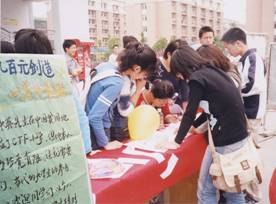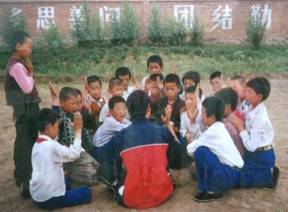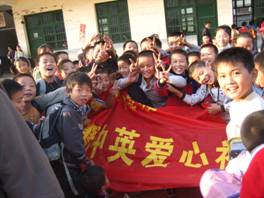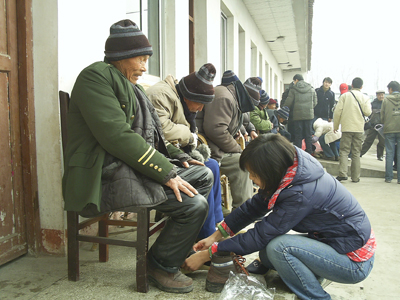Big Brother Big Sister Program
The program involves CT Scholarship recipients teaming up with, and providing assistance to, primary and middle school children in disadvantaged rural areas.
Assistance to CTF School Students |
|
 |
CT Scholarship recipients will seek donations to help primary school students defray educational expenses, thereby alleviating financial concerns and permitting the children to concentrate on their studies. As of the end of 2006, over 1,000 children received this assistance. The 2004 national policy on primary and secondary education also addressed the issue of schooling expenses, and as of January 2007, all primary school tuition and related expenses will be assumed by the government. The Foundation has since re-directed this financial assistance effort to help needy students from selected impoverished areas. |
| Students soliciting donations for CTF schoolchildren | |
| In 2004, while pursuing postgraduate work at the University of Nebraska, Lipan Li enlisted the support of the university’s Chinese Students and Scholars Association (“CSSA”) to initiate a Big Brother Big Sister Program with the CTF schoolchildren in China. CSSA established an annual fund drive for this purpose. For the past three years, several hundred dollars annually have been collected and forwarded to the Foundation to help support needy children in CTF Schools. Li is an alumnus of Zhejiang University’s CaringHeart Club. | |
Assistance to Disadvantaged StudentsUnder this new program, CT Scholarship recipients will target one or more primary and/or middle schools in selected impoverished areas. They will then conduct their own investigations, including personal interviews, to draw up a list of students who are considered to still require financial help. In addition to organizing fund drives, CT Scholarship recipients will also be mentoring the children and maintain contact with them throughout their years at school. |
 |
| University students visiting primary schoolchildren | |
| July, 2007 – Some seventy CaringHeart Club members from Xi’an University of Technology, Northwest University, and Xi’an Jiaotong University teamed up with other volunteers and traveled to ten impoverished villages in Zhouzhi County to look into the conditions of children of absentee parents. These are children whose parents have gone to seek work in urban areas and are away from home for over half the year. The purpose of the visit is to gain an understanding of the families’ size, economic circumstances, education levels, foster care arrangements, and of any resulting correlation with the children’s emotional and social needs and academic challenges. | |
 |
The information will form the basis for establishing a one-on-one Big Brother Big Sister arrangement. Over the longer term, the intent is to help the children develop and to overcome the financial, emotional, social and educational hurdles. Sixteen Club members from Xi’an Jiaotong University then paired up with sixteen of the children for a summer outing. They spent three days camping together and visited Northwestern A&F University’s gymnasium, library, arboretum, and zoological museums, and concluded with the sights of Xi’an, the provincial capital. A strong bond of friendship was forged from this event. |
| University students and the children at the Museum of Entomology | |
 |
Meetings between CaringHeart Club and CompassionateHeart Team members CT Scholarship recipients from the universities’ CaringHeart Clubs will meet periodically with CompassionateHeart Team members – their middle school Compassion ateHeart Scholarship counterparts – to exchange observations, ideas and recommendations from their community service experiences. |
| Middle School Compassion Team members welcoming University CaringHeart Club members | |
| January 2007 – Nanjing University’s Club members traveled to Suyu County to meet with the Compassion ateHeart Team members of Zaohe and Jingtou Middle Schools. The groups met to discuss and exchange ideas on personal conduct, social responsibility, and civic involvement. The groups then conducted surveys of Zaohe residents to obtain their viewpoints on these same issues. In Jingtou, the students went to visit a home for the elderly with absent families. They brought along donations of clothing and other articles for everyday use to give to the residents. |  |
| Students helping the elderly put on new shoes | |
|
|
|
|
|
|
